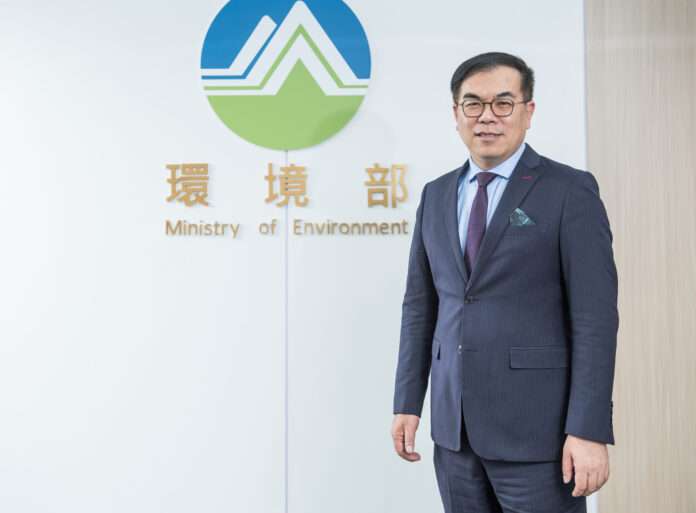環境部 彭啓明部長
2024年10月
【氣候變遷是危機也是轉機】
全球氣候變遷已深刻影響世界各國,臺灣作為全球的一份子,同樣面臨嚴峻的挑戰,尤其在近年,我們也見證了百年來最嚴重的大旱、強降雨及颱風的威脅。
賴清德總統積極推動「淨零轉型五大策略」,包括啟動第二次能源轉型,加速地熱、氫能、生質能和海洋能等再生能源,推動數位與綠色的產業雙軸轉型,並形塑淨零永續的綠生活,更將推動「不遺落任何人」的公正轉型。
【提升氣候治理倡議層級】
我國今年6月在總統府成立「國家氣候變遷對策委員會」,以國家整體發展的視野進行氣候治理與國際合作,針對淨零路徑、多元綠能減碳科技、綠色數位雙軸轉型、永續綠生活、公正轉型、綠色永續金融、國土永續調適韌性等七大主軸,強化因應氣候變遷溝通平台,加速政策落實並加大社會參與。
【建構碳定價機制帶動低碳轉型】
臺灣積極採取各項氣候行動,明確將「2050淨零排放」目標納入「氣候變遷因應法」,展現減碳決心,臺灣的碳費制度,等於全球碳稅的專款專用,已經完成各種立法工作,並將於2025年正式開始,企業也將在2025年中試行申報,初期一般費率訂為每公噸約10美元,依碳費費率審議會建議未來將以分階段調升為原則進行檢討,並建議2030年後可參考國際碳價水準,訂於每公噸約40至60美元之間,我們也承諾將會在四年內推動臺灣的排放交易機制(ETS),積極與全球接軌。這些政策的推展符合「巴黎協定」第六條藉由市場機制如碳定價制度,有效提升國家間氣候變遷減量行動合作,進而達成更具企圖心的氣候目標。
【透過綠色基金促進產業創新】
碳費只是碳定價制度的第一步,接下來
積極啟動綠色金融三大基金,帶動綠色產業發展。我們將成立百億臺幣的「綠色成長基金」,鼓勵發展國內淨零相關新興產業;爭取保險業與金融業資金,成立「綠色金融創新基金
長期投入我國各產業深度節能、淨零與資源循環產業;最後,「臺灣淨零基金」希望結合國內外減碳需求,與國內高碳排業者、創投業者及金融機構合作,主動評估參與各類減碳技術,加入臺灣國際級公司在全球減碳策略布局,加速淨零策略推動,帶動更多綠色投資。這不僅提升我國國際競爭力,也符合「巴黎協定
第九條推動已開發國家透過不同來源動員氣候資金之要求,為臺灣的永續發展奠定堅實的基礎。
【強化調適機制與永續韌性】
在調適面向上,我國今年5月發布新版「國家氣候變遷科學報告」,做為各地方政府與部會短中期調適因應之基礎科學資料,規劃早期預警機制及系統監測,提升各城市的環境韌性,包含建立多層次防災系統,從災害預測到應變與重建,全面提升應對災害的能力,打造「防災、調適、淨零」三項合一的韌性國土。以呼應「巴黎協定
第七條呼籲各締約方推動制定與落實調適政策,而我國也
持續透過早期預警機制及系統監測,完善國家調適政策措施。
【臺灣參與全球氣候行動貢獻己力】
臺灣是一個重要的經濟體和技術創新國家,我們在再生能源、氣候調適、以及低碳技術創新方面的能力,可以為全球氣候治理提供有力的支持。創新與實踐,是未來氣候行動很重大的關鍵,隨著臺灣碳定價的實施,以及相關創新技術的推動,臺灣將透過強化國內政策與制度,持續參與全球氣候行動。我們希望國際社會能夠理解,臺灣不只是想要參與,更重要的是我們有能力、也有責任為全球因應氣候變遷做出貢獻。
Taiwan’s commitment to climate action
Peng Chi-ming
Minister of Environment
November 2024
Climate change has greatly affected countries around the world. As a member of the international community, Taiwan also faces serious challenges in this area. In recent years, we have witnessed the most severe drought in a century, intense rainfall, and devastating typhoons.
President Lai Ching-te is promoting five key strategies for a net-zero transition. This involves initiating a second energy transition; accelerating development of renewable energy sources such as geothermal, hydrogen, biomass, and ocean energy; advancing a twin digital and green transformation of our industries, and shaping net-zero lifestyles. We are thus pressing toward a fair transition that leaves no one behind.
In June, Taiwan established the National Climate Change Committee under the Office of the President to address climate governance and international cooperation from the perspective of national development. The committee is focused on seven areas: pathways to net-zero, diverse green energy and carbon reduction technologies, the twin green and digital transformation, sustainable green lifestyles, a fair transition, green sustainable finance, and a sustainable homeland and adaptive resilience. The committee allows for better communication of the government’s climate change response, accelerates policy implementation, and enhances public participation.
Taiwan is taking many steps to address climate change. In a demonstration of commitment to emissions reduction, it has incorporated the 2050 net-zero emissions target into the Climate Change Response Act. Meanwhile, legislation has been completed to establish a carbon fee system, similar to a global carbon tax, that will take effect in 2025. Companies will begin trial reporting in the middle of 2025 at an initial standard rate of approximately US$10 per ton of carbon dioxide equivalent (tCO2e). The rate will be subjected to phased increases based on recommendations from the Carbon Fee Rate Review Committee and, by 2030, reach a level that mirrors international standards of between US$40 and US$60 per tCO2e. Taiwan has also pledged to launch an emissions trading system in the next four years that will further integrate it with global markets. These policies align with Article 6 of the Paris Agreement, which encourages international collaboration on climate action through market mechanisms such as carbon pricing to reach more ambitious climate goals.
The carbon fee is just the first step in Taiwan’s carbon pricing system. Following on this, Taiwan will launch three major funds to stimulate development of green industries. The Green Growth Fund of NT$10 billion will be established to encourage the growth of emerging domestic net-zero industries. Funding from the insurance and financial sectors will support the Green Finance Innovation Fund for long-term investments in energy-saving, net-zero, and resource-circular industries. Finally, the Taiwan Net-Zero Fund will work to meet domestic and international carbon reduction goals by partnering with domestic emissions-intensive industries, venture capital firms, and financial institutions to assess and invest in various carbon reduction technologies. This fund will also bring Taiwan’s leading companies into global carbon reduction strategies, accelerate net-zero initiatives, and attract greater green investment. Such moves will enhance Taiwan’s international competitiveness, are in line with Article 9 of the Paris Agreement, which calls for developed countries to mobilize climate finance from diverse sources, and will lay a solid foundation for Taiwan’s sustainable development.
In terms of adaptation, Taiwan released its latest National Climate Change Science Report in May. This report provides foundational scientific data for local governments and ministries for use in short- and medium-term adaptation planning. It addresses the development of early-warning mechanisms and system monitoring to improve urban environmental resilience. A multilevel disaster prevention system will be established that incorporates disaster prediction, response, and recovery measures to enhance disaster response capabilities and build a nation that is resilient thanks to integrated disaster prevention, adaptation, and net-zero goals. This aligns with Article 7 of the Paris Agreement, which calls on all parties to promote and implement adaptation policies. Taiwan will continue to use early-warning systems and monitoring measures to refine national adaptation policies.
As a major economy and a hub for technological innovation, Taiwan’s capabilities in renewable energy, climate adaptation, and low-carbon technological innovation can be of great help to global climate governance. Innovation and implementation will be critical drivers of climate action. With the advent of carbon pricing and the promotion of related innovative technologies, Taiwan will participate in global climate action through enhanced domestic policies and systems. We hope the international community will recognize that Taiwan is willing and able to contribute to global climate change efforts.














































